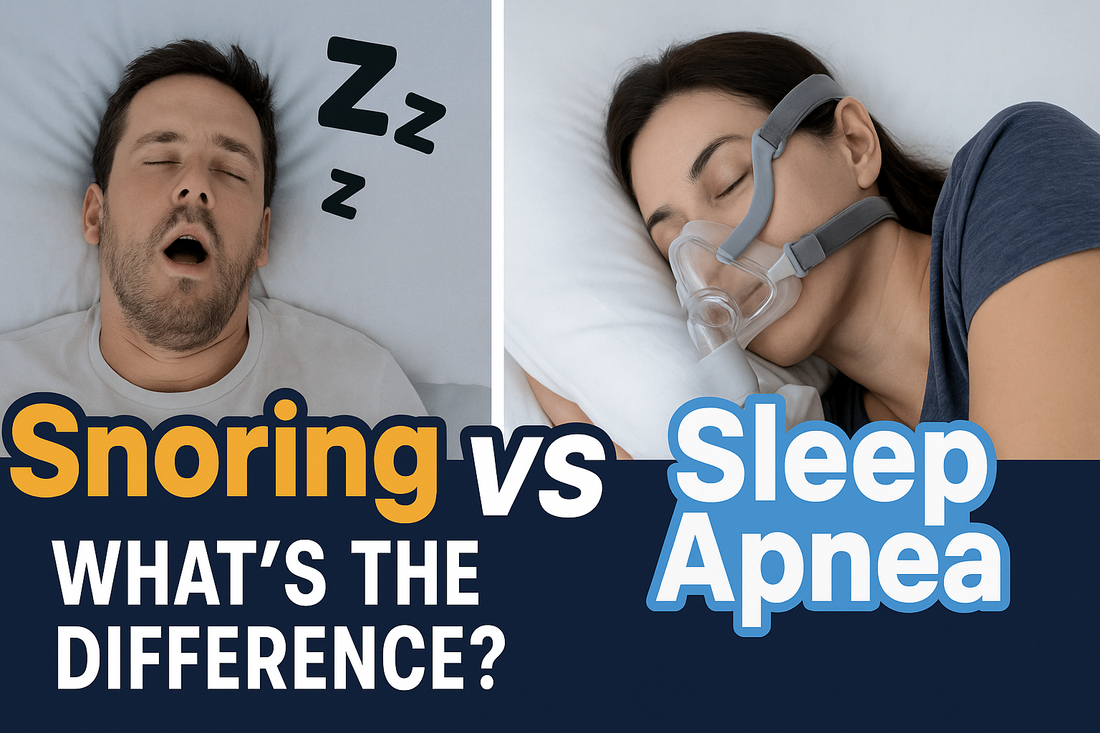
Snoring vs Sleep Apnea – What’s the Difference?
Share
We all know someone who snores, and many of us may even do it ourselves. While snoring is often dismissed as a harmless annoyance, it can sometimes signal a more serious condition known as sleep apnea. Understanding the difference is essential for protecting your health and ensuring better sleep.
What is Snoring?
Snoring occurs when the flow of air through your mouth and nose is partially blocked during sleep. This causes the surrounding tissues to vibrate, producing that familiar rumbling sound.
Key points about snoring:
- Usually harmless, but can disturb partners or family members.
- Caused by relaxed throat muscles, nasal congestion, alcohol, or sleep position.
- Can sometimes be an early warning sign of a bigger problem.
What is Sleep Apnea?
Sleep apnea is much more than loud snoring. It’s a medical condition where breathing repeatedly stops or becomes very shallow during sleep. These pauses can last from a few seconds to over a minute, occurring multiple times a night.
Types of sleep apnea:
- Obstructive Sleep Apnea (OSA): The airway becomes blocked, usually by the tongue or soft tissue collapsing.
- Central Sleep Apnea (CSA): The brain fails to send proper signals to the breathing muscles.
- Complex Sleep Apnea: A combination of both OSA and CSA.
Symptoms include:
- Loud, persistent snoring
- Episodes of stopped breathing during sleep (often noticed by a partner)
- Waking up gasping or choking
- Daytime fatigue, headaches, or irritability
- Difficulty concentrating
Why the Difference Matters
While snoring itself might not always be dangerous, untreated sleep apnea can lead to:
- High blood pressure
- Heart disease and stroke
- Diabetes complications
- Increased risk of accidents due to daytime sleepiness
This is why identifying the difference is critical. If snoring is frequent, loud, and comes with other symptoms, it’s worth getting evaluated by a healthcare professional.
Treatment Options
- For snoring: Lifestyle changes such as weight management, reducing alcohol intake, changing sleep position, and using nasal strips.
- For sleep apnea: Medical solutions like CPAP (Continuous Positive Airway Pressure) therapy, oral appliances, or in some cases, surgery.
The Role of CPAP Therapy
CPAP therapy is the most common and effective treatment for obstructive sleep apnea. It works by delivering a steady flow of air through a mask, keeping the airway open all night. This results in quieter sleep, fewer health risks, and more energy during the day.
Final Thoughts
Snoring may be common, but it should never be ignored if it’s accompanied by fatigue, gasping, or pauses in breathing. While snoring is just a sound, sleep apnea is a serious health condition that needs attention.
👉 If you or your loved one struggle with snoring or suspect sleep apnea, take action today. Explore trusted CPAP solutions at CPAPsavers.comand start your journey to healthier sleep.
